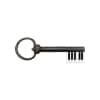A:
Don’t worry—the piano doesn’t send you through a portal to Opposite World or anything like that! Your right hand has an advantage at the piano because of the piano’s construction.
On the piano, notes get higher and higher the further to the right they are on the keyboard. (The first episode of Piano Unlocked, “Finding the Keys,” has a great explanation about what it means for notes to get higher and higher!) Since the melody is usually the highest note of a piece of music, it’s usually in the right hand. In most music for newer piano students, the melody takes the spotlight, and the composer makes sure the left hand won’t overshadow it. Since it gets so much more use, the right hand develops more strength and facility than the left hand.
But what if you keep going with the piano? Won’t the left hand catch up? Well, the left hand will definitely have more and more to do as you work on increasingly difficult music. But here are excerpts from two notoriously difficult piano pieces: Liszt’s Piano Sonata and Ravel’s Gaspard de la nuit.
 The left hand definitely works hard in this excerpt. But look at the right hand: it’s absolutely hair-raising!
The left hand definitely works hard in this excerpt. But look at the right hand: it’s absolutely hair-raising!
 And in the Ravel, what’s the left hand doing while the right hand is tackling that extraordinarily tricky filigree? It’s playing the melody, one note at a time!
And in the Ravel, what’s the left hand doing while the right hand is tackling that extraordinarily tricky filigree? It’s playing the melody, one note at a time!
Now, there is definitely music that will give your left hand a workout. Ravel has a piano concerto for the left hand alone that involves lots of virtuoso technique. There are parts of Chopin’s etudes that focus on the left hand (though there’s no Chopin etude in which the left hand is the primary focus!) But by the time pianists are able to play these intensive left-hand pieces, they’ve already played such difficult right-hand music that the right is still the stronger, more developed hand.

